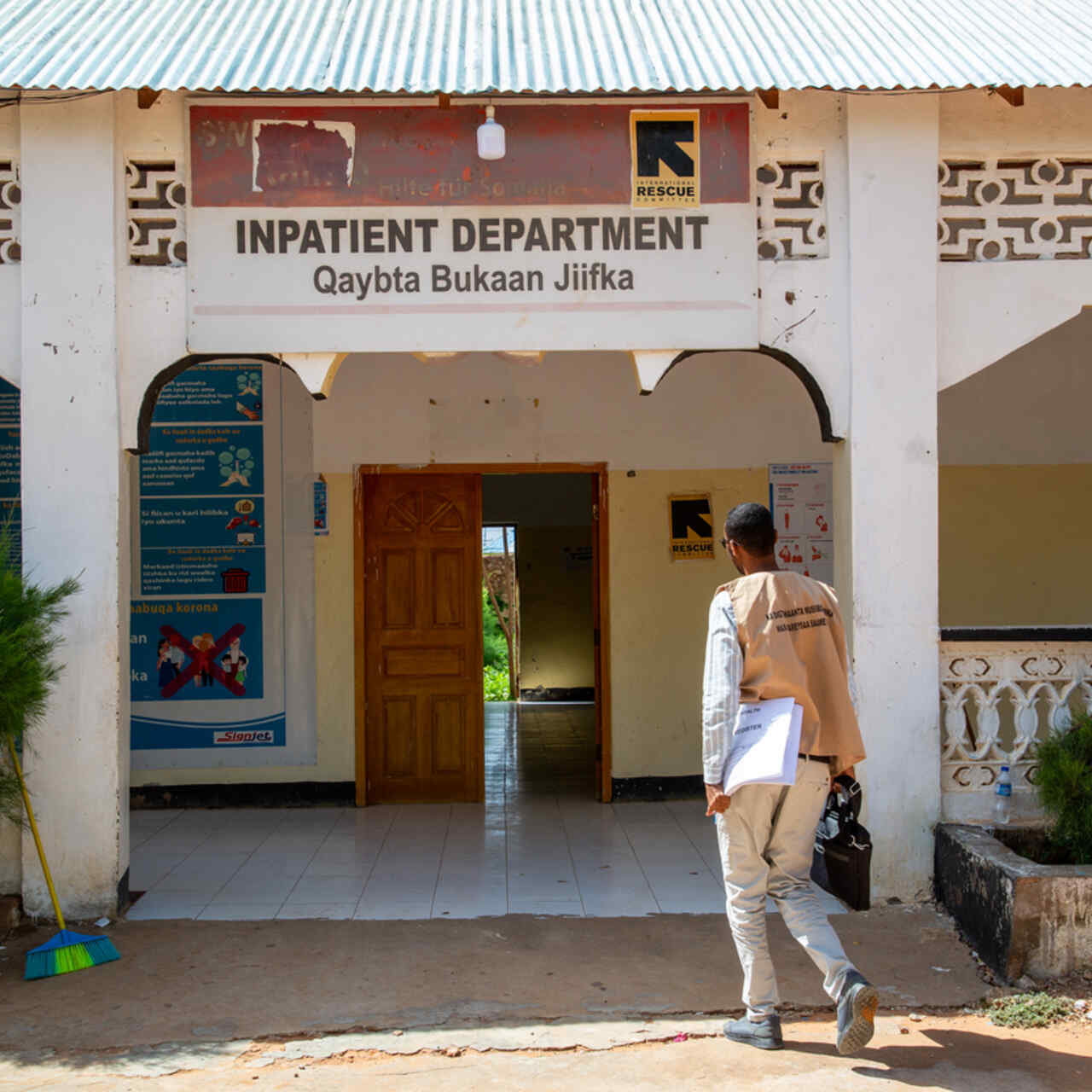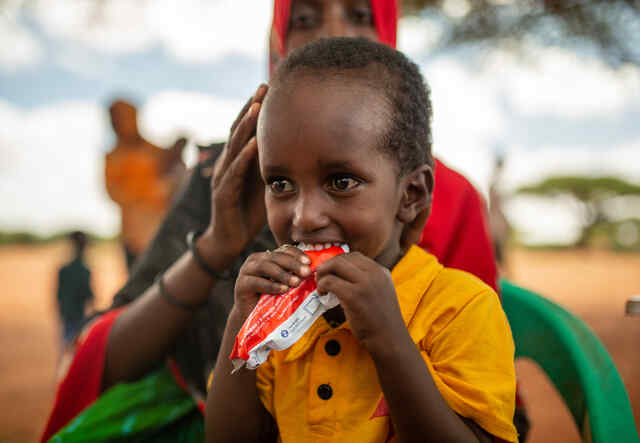
Meet the IRC doctors fighting against malnutrition in Somalia
Dr. Abdullahi Mohamed and Dr. Ahmed Adan are making significant efforts to transform malnutrition prevention and treatment.

Dr. Abdullahi Mohamed and Dr. Ahmed Adan are making significant efforts to transform malnutrition prevention and treatment.
It's hard to imagine the heartbreak of learning that your child is dangerously malnourished. Sadly, this is a common reality for parents in Somalia, where a staggering 50 percent of children are currently experiencing acute malnutrition. To make matters worse, there is often not enough food available to provide them with the vital nutrients they need to survive and thrive.
To combat acute malnutrition in Somalia, the IRC has established clinics, empowered community health workers, launched mobile health units and is simplifying the process of diagnosing and treating affected children.
Meet two of the faces behind this vital work: Dr. Abdullahi Mohamed, senior medical officer, and Dr. Ahmed Adan, nutrition officer, based in the Galgaduud region of Somalia.

Families in Somalia have been waiting for rains for nearly three years—but when the rain finally came, it washed away what little crops and livestock remained. The extended drought has depleted the soil, preventing it from absorbing the rain that was needed to grow crops.
“This causes animals to die, and large numbers of people who are livestock keepers have migrated from rural areas to urban areas,” Dr. Ahmed explains. “When they come to urban areas, they settle in displacement camps, where people are suffering from food insecurity and lack of nutrition. Often there’s also not enough clean water."

Dr. Abdullahi, senior medical officer, has witnessed a sharp rise in malnutrition cases, especially among children, due to the severe and prolonged drought in the country.
Severe acute malnutrition leads to thinness, weakness, and lethargy in children. They experience near-constant diarrhea, muscle atrophy and weakened immune systems. Emotionally, they tend to withdraw and disengage from the world around them. Untreated acute malnutrition can cause stunted growth, learning difficulties and weak immunity to infections.
“We live in a country in which the number of emergencies is tremendously high,” says Dr Abdullahi. “Our people are facing emergency situations in terms of medical services that are caused by devastating droughts in the country for the last four decades.” His determination to help as many families as possible is what led him to join the IRC.

Dr. Abdullahi is on the frontlines of supporting young patients at the IRC-supported hospital in Dhusamareb. His dedication to his work is truly inspiring. He often starts his day at 7 a.m. and sometimes stays overnight to respond to emergency cases and ensure patients get the treatment they need to survive and recover fully.
Together with his team of community health workers, Dr. Abdullahi is tirelessly working to reach as many people as possible, delivering services at the hospital as well as in people’s homes. Their community mobilization efforts include using various platforms such as radio, the media, and in-person meetings to raise health awareness among community members.
Also supporting the IRC malnutrition programs in the same region, Dr. Ahmed makes rounds from site to site to ensure mobile clinics and stabilization centers are operating well and that children are receiving the necessary treatment to recover and thrive.
“When I go to stabilization centers, I supervise children with malaria complications and those suffering from severe malnutrition with complications; I check in on how they are recovering,” Ahmed says.
“Then I proceed to go to the Outpatient Therapeutic Program (OTP) in Hanano Hospital and review how the treatment of moderate acute malnutrition and severe acute malnutrition is going in the children who are admitted there.”
Currently, there are two different treatment pathways for children with severe acute malnutrition and children with moderate acute malnutrition, which two different United Nations agencies support. However, the IRC has been leading the fight against child malnutrition for years and has developed a combined and simplified protocol that treats children with severe and moderate acute malnutrition together.
Unfortunately, when a child with severe acute malnutrition recovers but is still categorized as having moderate acute malnutrition, they may be referred to a different clinic for treatment, or treatment may be stopped altogether. This can lead to a backslide in their health, putting them right back in the severe category, where their risk of death is nearly ten times higher than that of a healthy child.
“But when you are implementing the combined protocol, the child will have access to both services in one location with no need to travel to another location to get the other services,” Dr. Abdullahi explains.
Acute malnutrition is first diagnosed by height and weight measurements by using the combined protocol. By using a specialized color-coded measuring tape called a mid-upper-arm circumference (MUAC) tape, community health workers or even parents in remote areas can easily test children for malnutrition at home and monitor their recovery once treatment starts.

Luckily, ready-to-use therapeutic food (RUTF) packets can be used to treat malnourished children. These packets of nutritious peanut-based food are lightweight and don’t require cooking or refrigeration. Most children typically take about eight weeks of treatment for their mid-upper arm or weight measurements to reach normal levels for their age.
“The IRC is the only organization that is implementing the combined protocol in Somalia. In general, that is one of the services where the IRC is unique,” Dr Abdullahi explains.

Dr. Abdullahi remains motivated by focusing on the people he supports amidst Somalia's ongoing drought and food crisis.
“When you provide a lifesaving service and find out at the end of the day that the case is improving, surviving, and recovering, that is what really encourages you,” he says. “The feedback we get from the clients that we provide for is their gratitude to get such free and accessible services at their convenience.”

Similarly, Ahmed is proud of the opportunity to serve his community—something he’s dreamed of doing since he was young. “Seeing children recover from malnutrition and become healthy is what drives me to keep working,” he proudly explains.
After seeing the IRC’s programs expand to other areas, Ahmed looks forward to watching these life-saving services reach even more children and families. “When we first came here as the IRC, there were no organizations that used to carry out assistance,” he explains. “Now, we have reached Abudwaq and Adado [cities that are nearly 100 km from Dhusamareb]. So, as time goes on, we are going to see these interventions taken to many more areas in Galmudug state.”
But he also hopes for his country to one day find peace and rest from all the crises it has experienced. “My hope for the future is for the country of Somalia to become stable and prosperous, where Somali people can live peacefully.”

The IRC has been operational in Somalia since 1981, where it currently supports communities in Galmudug, Southwest, and Puntland states, as well as in the Banadir (Mogadishu) region. The IRC’s staff in Somalia are scaling up programs to address the current drought and rising food insecurity, and we are expanding to new areas to meet severe needs. We provide a range of services, including health, nutrition, water, and sanitation, as well as support for women’s protection and empowerment. We also provide cash assistance to populations affected by the drought across the country.